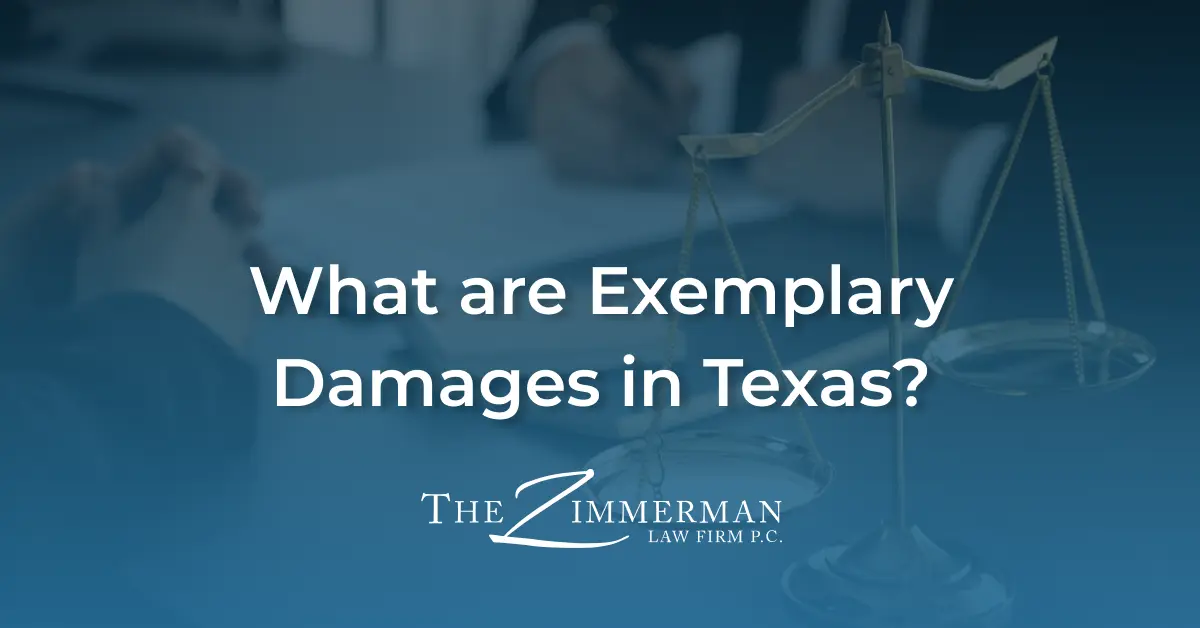 Information
Information
When pursuing a personal injury claim, the most common compensation you will receive is reimbursement for your economic and noneconomic damages.
These damages include medical expenses, lost wages, pain and suffering, property damage, and more. In some situations, you might hear someone talk about exemplary damages.
Understandably, some clients ask what are exemplary damages, and how do you get them?
In this article, the personal injury lawyers at the Zimmerman Law Firm go over the details of exemplary damages in Texas. If you have any questions, please contact us today.
Exemplary Damages Definition
Another name for exemplary damages is punitive damages. Compensatory damages, such as economic and noneconomic damages, are designed to put you back in your pre-accident situation as if the accident or event never occurred.
Punitive damages punish the defendant for their behavior. The purpose of punitive damages is to deter the defendant and others from acting similarly in the future.
When Does the Court Award Exemplary Damages?
Courts award Texas exemplary damages relatively infrequently. Texas statutory law defines what types of situations qualify for exemplary damages.
Before the court considers a punitive damages award, you must show clear and convincing evidence that the defendant’s harmful actions resulted from malice, fraud, or gross negligence.
The burden is on the plaintiff to make that showing.
General negligence, deceptive trade practices, or bad faith actions won’t qualify for exemplary damages. Before a jury awards punitive damages, it must be unanimous in its decision on liability and the amount of exemplary damages.
This requirement is very challenging to meet, which is why exemplary damage awards are not very common in Texas.
There are some situations where you can not receive exemplary damages, even if you would otherwise be eligible. For example, when the court only awards nominal damages, there can be no punitive damages award.
Punitive Damages Cap in Texas
Texas caps the maximum amount of exemplary damages you can receive.
Texas law doesn’t allow punitive damages above $200,000 or twice the amount of your economic damages, plus an amount equal to your noneconomic damages, up to a maximum of $750,000.
This cap does not apply to conduct the defendant did knowingly or intentionally, including causing serious bodily injury because they were driving drunk.
Factors Jury Use When Deciding Punitive Damages
When deciding on an award for exemplary damages, jurors must consider six main things:
- The nature of the wrong,
- The defendant’s character,
- The defendant’s degree of culpability,
- The situation and sensibilities of involved parties,
- The extent to which the defendant’s conduct offends the public’s sense of justice and decency, and
- The defendant’s net worth.
If you have questions about what are exemplary damages and whether you qualify to receive them, speak with an experienced Texas personal injury lawyer.
Contact an Experienced Texas Personal Injury Attorney Today
Ready to pursue exemplary damages? The Zimmerman Law Firm’s experienced and dedicated injury attorneys are here to guide you through the process. We serve Waco, Killeen, Temple, Austin, Round Rock, and surrounding communities. Contact us at 254-752-9688 for personalized legal assistance.


